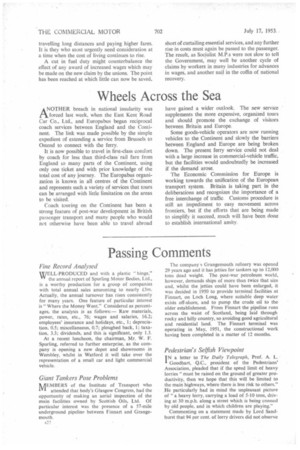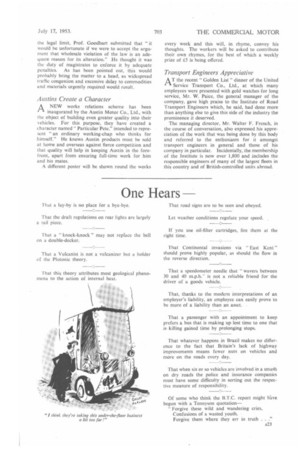Passing Comments
Page 24

Page 25

If you've noticed an error in this article please click here to report it so we can fix it.
Fine Record Analysed
WELL-PRODUCED and with a plastic "hinge," " the annual report of Spurling Motor Bodies, Ltd., is a worthy production for a group of companies with total annual sales amounting to nearly £3m. Actually, the annual turnover has risen consistently for many years. One feature of particular interest is" Where the Money Went." Considered as percentages, the analysis is as follows:— Raw materials, power, rates, etc., 76; wages and salaries, 16.2; employees' insurance and holidays, etc., 1; deprecia• tion, 0.5; miscellaneous, 0.7; ploughed back, 1; taxation, 3.3; dividends, and this is significant, only 1.3.
At a recent luncheon, the chairman, Mr. W. F. Spurting, referred to further enterprise, as the company is opening a new depot and showrooms in Wembley, whilst in Watford it will take over the representation of a small car and light commercial vehicle.
Giant Tankers Pose Problems
MEMBERS of the Institute of Transport who attended that body's Glasgow Congress, had the opportunity of making an aerial inspection of the main facilities owned by Scottish Oils, Ltd. Of particular interest was the presence of a 57-mile underground pipeline between Finnart and Grangemouth. The company s Grangemouth refinery was opened 29 years ago and it has jetties for tankers up to 12,000 tons dead weight. The post-war petroleum world, however, demands ships of more than twice that size and, whilst the jetties could have been enlarged, it was decided in 1950 to provide terminal facilities at Finnart, on Loch Long, where suitable deep water exists off-shore, and to pump the crude oil to the older establishment. From Finnart the pipeline runs across the waist of Scotland, being laid through rocky and hilly country, so avoiding good agricultural and residential land. The Finnart terminal was operating in May, 1951, the constructional work having been completed in a matter of 12 months.
Pedestrian's Selfish Viewpoint
IN a letter to The Daily Telegraph, Prof_ A. L. 1 Goodhart, Q.C., president of the Pedestrians' Association, pleaded that if the speed limit of heavy lorries "must be raised on the ground of greater productivity, then we hope that this will be limited to the main highways, where there is less risk to others." He particularly had in mind the unpleasant picture of "a heavy lorry, carrying a load of 5-10 tons, driving at 30 m.p.h. along a street which is being crossed by old people, and in which children are playing."
Commenting on a statement made by Lord Sandhurst that 94 per cent. of lorry drivers did not observe the legal limit, Prof. Goodhart submitted that "it would be unfortunate if we were to accept the argument that wholesale violation of the law is an adequate reason for its alteration." He thought it was the duty of magistrates to enforce it by adequate penalties. As has been pointed out, this would probably bring the matter to a head, as widespread traffic congestion and excessive delay to commodities and materials urgently required would result.
Austins Create a Character
A NEW works relations scheme has been " inaugurated by the Austin Motor Co., Ltd., with l he object of building even greater quality into their vehicles. For this purpose, they have created a character named " Particular Pete," intended to represent "an ordinary working-chap who thinks for himself." He knows Austin products must be sold at home and overseas against fierce competition and that quality will help in keeping Austin in the forefront, apart from ensuring full-time work for him and his mates.
A different poster will be shown round the works every week and this will, •in rhyme, convey his thoughts. The workers will be asked to contribute their own rhymes, for the best of which a weekly prize of 15 is being offered.
Transport Engineers Appreciative
AT the recent "Golden List" dinner of the United " Service Transport Co., Ltd., at which many employees were presented with gold watches for long service, Mr. W. Paice, the general manager of the company, gave high praise to the Institute of Road Transport Engineers which, he said, had done more than anything else to give this side of the industry the prominence it deserved.
The managing director, Mr. Walter F. French, in the course of conversation, also expressed his appreciation of the work that was being done by this body and referred to the enthusiasm for it amongst transport engineers in general and those of his company in particular. Incidentally, the membership of the Institute is now over 1,800 and includes the responsible engineers of many of the largest fleets in this country and of British-controlled units abroad.




















































































